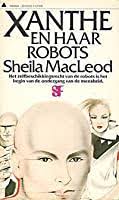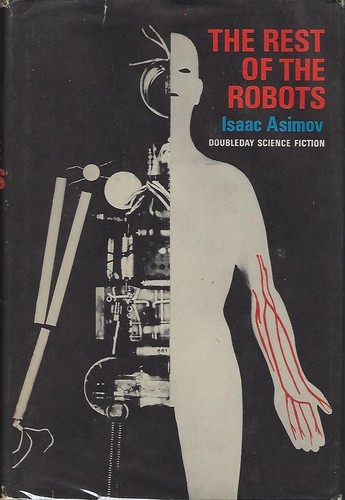Sheila McLeod, Xanthe and the Robots (1977).
GoodReads meta-data is 240 pages rated 3.31 by 16 litizens.
Genre: Sy Fy.
Verdict: Seminar.

At an isolated but relaxed research institution Philophrenic robots are in development. Pragmapractor robots are extensively used for simple and repetitive tasks, like telling people to brush their teeth. (Joke.) But the Philophrenics have much more complex programming and, perhaps, even emotions. Xanthe is one of the programers and the story is told from her perspective.
Xanthe is an only child, an introvert, solitary, obsessive, creative, and likes things that way. Xeno the director of the institute saddles her with an assistant, despite her objections, and he becomes a source of tension. While Xanthe swallows the libido-blocking tablets each day, the better to concentrate entirely on her work 18-hours a day, …. But the reader knows that Daiman, the unwanted assistant, will overcome that chemical barrier. There is no other reason for him to be there.
The Philophrenics are programmed in the humanities not science or engineering. Thus they know the works of Ibsen, Melville, Brownings, Byron, and prove it by spouting quotations. Each has a programmer whose personality shapes the bot, though it is not supposed to do so.
Only half-way through the book does the reader learn that beyond the Institute’s walls the world is disintegrating into chaos, although it seems a polite sort of chaos compared to the kind the Republican Party creates these days. Meanwhile, the Philophrenic robots develop wills of their own and demand autonomy which is conceded. However no sooner do the Philophrenics take over than the Pragmapractors go on strike. It seems that they do not wish to take orders from other robots. (At this point I expected Jim Kirk to appear and talk the robots to death in the great Star Trek tradition of low budget endings.)
The Philophrenics we learn in a sotto voce narrative from Xanthe were supposed to be perfected humanity, creatures of reason and knowledge, untainted by the weakness of the flesh. Like the Pragmapractors, the Philophrenics are sexless, though there are anticipations that the latter may come to demand sex in order to more closely approximate human beings. Remember Mr Data or the Tin Man? Try as the members of the Institute might, the robots cannot be any more perfect than the humans who program them, and we see early on the personality of programmer is reflected in the robot. (It seems one programmer works on/with one robot.)
The Philophrenics seems poorly suited for the autonomy they demand since they are totally imbued with literature, and nothing else. When granted freedom to create their own names they invariably choose the name of a literary character, and when they are also allowed to dress themselves (having theretofore worn coveralls or kaftans) they choose period clothing for the name they have chosen. Do we detect a lack of imagination here? (By the way, how such clothing is produced is off stage.) but then why are they clothed at all?
Aside: the only other time clothing is mentioned it is used to indicate exasperation when Xanthe notes that Xeno’s necktie is at half mast. We are spared the detailed and pointless description of clothing that pads out so much genre fiction. Nor are meals described and decor detailed. Finally, there is no description of the robots, except that they are made in our image.
All the programmers have code names and that is never explained within my attention span.
Once autonomous, the bots rapidly set about making all too human errors by dividing into hostile groups, going on ego trips, lolling around…. Meanwhile, Daiman and Xanthe become, as long predicted, a couple while the Institute disintegrates around them. The conflict between the Pragmapractors and Philophrenics turns violent with the humans in between, not quite trusted by either camp, but trusted more than the other camp.
In the end Daiman and Xanthe leave the shelter of the Institute to brave the misery of real world. That last phrase was not used but it seems right.
About midway there are explicit references to the laws built into bots but Asimov is not named.

The verdict above, ‘Seminar,’ indicates how wordy the text is. Every character is articulate and there are pages and pages of talk, or silent narration from Xanthe, and very little movement. When Xanthe reluctantly takes a holiday earlier, well, that is one of the weakest parts of the text.
This reader was left perplexed as to what conclusion to draw. Moreover, the external chaos is never explained, and neither is any role for the robots in that wider world which undermines the whole purpose of the Institute. In that way, we seem to have only part of the story. While at the Institute there are schedules and work, it never seems connected to the desperate world out there. It is indeed an Ivory Tower. The Philophrenics will do nothing to reduce the chaos, though the Pragmapractors might.

I came across a reference to it somewhere, now forgotten, and being intrigued I found a used paper copy from Abe Books (despite being owned by Amazon, its stock does not appear in Amazon searches) and got it. It is not available in an e-book. She has many other titles.

